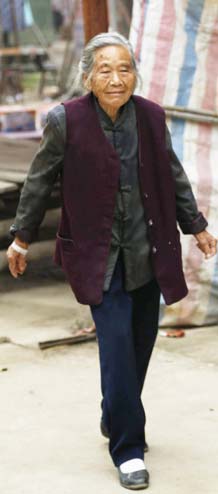One of life's survivors
Cheng's pride has a reason: She was born into a prominent family. Her father was the head of Tianmen county, where she was born, and several of her uncles were senior officers in the Kuomintang army.
Cheng still looks nimble and remembers much of her history. When talking of her early life, happy smiles occasionally surface on her wrinkled face.
Cheng grew up in an age when China was engaged in civil war and threatened by Japanese invasion. When she was 13, she was selected by the local government and sent to a military school.
"All the 600 selected teenagers were born into rich or powerful families," Cheng says.
Three years later she graduated and became a military trainer in the No 128 Army. The 16-year-old's excellent shooting skills won her respect.
"In a contest I got top scores for all five shots. The chief officer was so happy he gave me a gold watch as a gift."
Unlike ordinary soldiers, who were given a fixed amount of bullets she had as much ammunition as she needed due to her family ties in the army and could practice when she wanted, she explains.
Since joining the army in 1937, when the War of Resistance against Japanese Aggression (1937-45) started, Cheng has lost count of the battles she fought in and how many people she has killed.
Relying on more advanced weapons, the Japanese army occupied much of China's prosperous eastern part within the first year of the war, which lasted for eight years, until Japan surrendered in 1945.
However, when the invading army marched to Wuhan, Hubei province, they lost much of their advantage.
"This area was intersected by numerous rivers and lakes," Cheng says. "So many battles were fought on water, which was less familiar to the Japanese army."























